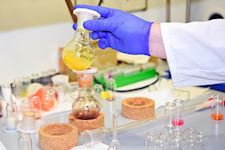Chemistry
[ Winter SALE ] !!! | Up to 99% Discount!!! | FREE PDF Certificate | Audio Visual Training | **Lifetime Access**
The Teachers Training
Summary
- Tutor is available to students
Overview
*** Premium & Updated Study Materials Included | Lifetime Access ***
Explore the elements of the earth through the eye of Chemistry, also called the ‘Central Science’. Gain an understanding of chemical reactions, atom formation, and other subject matters while learning about organic and inorganic chemistry in this Diploma. Essentially, you’ll gain in-depth knowledge of basic to advanced from this course. So, enrol now and start learning today.
Starting with basic chemistry, this course explains atomic models, chemical bonding formulas, laws of thermodynamics, periodic table and other areas of studies in Chemistry. It shows the difference between acids and bases and reactions involving them. You’ll also learn how to measure the pH and pOH and their significance in different chemical processes.
Moreover, the course also incorporates different branches of chemistry with step by step lessons. While learning about various theories and laws of chemistry, you’ll also understand their applications in industry, nuclear sector, laboratory, and environment. Hence, upon completing this course, you’ll have a strong grasp of a wide variety of subject areas related to chemistry.
On top of that, this course is CPD accredited, with 20 CPD points to be added to your portfolio after finishing it. This Advanced Diploma consists of 24 modules, and you can complete the entire course with just 10 hours of study.
As one of the top course providers in the UK, we’re committed to providing you with the best educational experience possible. Our industry experts have designed the Advanced Diploma to empower you to learn all at once with accuracy. As a result, you can take the Advanced Diploma at your own pace — anytime, from anywhere.
Skills You Will Gain:
After completing the course, you will be able to —
- Learn about introductory Chemistry and know the applications of Chemistry in everyday life
- Explain the concepts of matter, elements, compounds and the chemical properties of them
- Learn about atomic models and structure, and study different types of chemical bonds
- Measure heat & temperature, know about the conversion of energy, calorimetry and different laws.
- Gain an understanding of the Periodic table of elements, their classifications and properties
- Understand the law of gases, significant properties of gas, and applications of gas in our daily lives
- Find the connection between Electricity and Chemistry and their real-life applications for various purposes.
- Differentiate between acids and bases, reactions involving acids and bases, and how to calculate the pH of them
- Broaden your knowledge of Chemistry in various sectors, e.g. Biochemistry, Nuclear chemistry, Industrial Chemistry and more
- Demonstrate a laboratory safety and chemical hygiene plan following standard safety practices
CPD
Course media
Description
Why Study Chemistry Level 4 Advanced Diploma with Teachers Training:
Here are just some of the reasons why our students enrol on the Advanced Diploma course:
- Access the course through our dedicated online learning platform
- 24/7 access to tutor support
- The course is packed with interactive course content
- Affordable prices and high-quality training
- Complete the course 100% online, from any internet-enabled device
- Flexible course deadlines with full access to the course for one year
Course Curriculum
*** Chemistry Level 4 Advanced Diploma ***
Module 01: Introduction to Basic Chemistry
- What is Chemistry?
- Divisions of Chemistry
Module 02: Understanding Matter
- Concept of Matter
- Classification of Matter
- Elements
- Compounds
- Homogeneous vs Heterogeneous
- Some Chemical Properties
Module 03: Atom
- Relative Mass
- The Law of Definite Proportions
- Dalton’s Atomic Theory
- Bohr’s Atomic Model & Limitations
- Atomic Structure
- Atomic Properties
- Uses of Radio-isotopes
Module 04: Chemical Bonding
- Chemical Bond
- Classification of Chemical Bonds
- Ionic Bond
- Covalent Bond
- Ionic Bond vs Covalent Bond
- Metallic Bond
Module 05: Energy
- Measuring Energy Changes
- Heat
- Temperature
- Conservation of Energy
- Calorimetry
- Hess’s Law
- Bond Enthalpy
- Energy Cycles
- Lattice Enthalpy
- Entropy
- Spontaneity
Module 06: Periodic Table
- The Modern Periodic Table
- Alkali Metals
- Alkaline Earth Metals
- Halogens
- Hydrogen
- Helium
- Metals
- Non-Metals
- Metalloids
- Transition Elements
- F-Block Elements
- Periodicity and Trends
Module 07: Intermolecular Forces
- What are Intermolecular Forces?
- Hydrogen Bonding
- Ionic Bonding
- Ion-Dipole Forces
- Ion-Induced Dipole Forces
- Van der Waals Forces
- Solid
- Liquid
- Gas
Module 08: Gases
- Understanding Gas
- Properties of Gases
- Kinetic Molecular Theory of Gases
- The Gas Laws
- Vapour Pressure
- Partial Pressure
- Applications of the Gas Laws
Module 09: Solution
- What is a Solution?
- The Solution Process
- Electrolytes
- Concentration of Solution
- Solubility of Gases
- Reactions of Solutions
- Distillation
- Colloids and Suspensions
Module 10: Chemical Equilibrium
- Definition
- The Collision Theory
- Characteristics of Equilibrium State
- Important Examples of Chemical Equilibrium
- Equilibrium Constant
- Factors Affecting Reaction Rates
- Le Chatelier’s Principle
- Effect of Concentration Change
- Effect of Temperature Change
- Effect of Pressure Change
- Effect of Catalysts
Module 11: Kinetics and Equilibrium
- Chemical Kinetics
- Reaction Rates
- Law of Mass Action
- Rate and Equilibrium Constants
- The Half-Life
- Kinetic Principles
- Applications and Models
Module 12: Acids and Bases
- Definition of Acids and Bases
- Theories of Acids and Bases
- General Properties of Acids and Bases
- Strengths of Acids and Bases
- Acid Concentration
Module 13: pH and pOH
- Concept of pH and pOH
- Measurement of pH
- Neutralisation Reaction
- Buffers
- Relationship Between pH and pOH
- Acidity Level: pH
- Importance of pH
Module 14: Reactions Involving Acids and Bases
- Introduction
- Neutralisation Reaction
- Acids with Metals
- Metal and Nonmetal Oxides with Water
- Metal Oxides with Acids
- Hydrolysis
- Acid-Base Titration Curves
Module 15: Redox Reaction
- Define Redox Reaction
- Oxidation-Reduction Reactions
- Oxidation Number
- Stock Notation
- Ion-Electron Method
Module 16: Electricity and Chemistry
- Electrochemistry
- Electrochemical Cell
- Electrolysis
- Batteries
- Voltaic Cell
- Cell Potential
- Electroplating
Module 17: Inorganic Chemistry
- Metals
- Metallurgy
- Alloys and Amalgams
- Organometallic Compound
- Hydrogen and Hydrides
Module 18: Organic Chemistry
- Organic Compound
- Some Basic Definitions
- Isomers
- Hydrocarbons
- Alkanes
- Organic Families
Module 19: Biochemistry
- What is Biochemistry?
- Carbohydrates
- Lipids
- Proteins
- Nucleic Acids
- Biotechnology
Module 20: Nuclear Chemistry
- Nuclear Stability and Radioactivity
- Radioactive Decay and Nuclear Reactions
- Half-Life and Radiometric Dating
- Nuclear Medicine
Module 21: Industrial Chemistry
- Chemical Industry
- Most Used Chemicals
- Hard Water
- Environmental Protection
Module 22: Environmental Chemistry
- Stratospheric Ozone Depletion
- Acid Rain
- The Greenhouse Effect
- Pesticides
Module 23: Laboratory Safety
- Laboratory Hazards
- Safety Awareness
- Protective Equipment
- Laboratory Safety Equipment
- First Aid and Emergency Procedures
- Chemical Safety
- Biological Hazards
- Hazard Recognition and Control
- Electrical Hazards
- Fire Hazards
- General Housekeeping Rules
Module 24: Chemical Hygiene Plan
- Organisation and Content
- Required CHP Elements
- Worker Training Must Include
- Medical Exams and Consultation
Course Assessment
To successfully complete the course, students will need to complete a multiple-choice question assessment. All our assessments are online, and you will receive instant results through our online platform.
Certification
CPD Certification from Teachers Training
After successfully passing the multiple-choice assessment, you will qualify for a CPD Certification from Teachers Training.
- Get instant access to your free PDF certificate after successfully completing the assessment
- Order a hard copy certificate to be posted to you for only £8.99!
Your course certificate will add new, exciting skills to your CV and allow you to stand out from the crowd when applying for teaching jobs.
Who is this course for?
This Chemistry Level 4 Advanced Diploma course is ideal for:
- Higher Secondary Students
- Teachers who want to brush up their knowledge of Chemistry
- Anyone interested to gain an advanced understanding of Chemistry
- Any aspiring professional who needs a good knowledge of Chemistry
Requirements
This course from Teachers Training has no formal entry requirements. However, to study the Chemistry Level 4 Advanced Diploma students must:
- Have a strong passion for learning
- Display a good understanding of the English language, as well as numeracy and IT skills
- Have a desire for entrepreneurship
- Be over the age of 16
If you meet these criteria, you can start studying the Advanced Diploma course straight away!
Career path
This course will prepare the students to be even more complete and compatible in their professional careers. Hence this course can be the first step to become a —
- Lab Assistant
- Chemist
- Teacher
- Aspiring professional work in the area of Chemistry
Questions and answers
Hi Can I take this chemistry course? I've interest in Chemistry and chemistry related terms. Tell me the procedure to take this chemistry course?
Answer:Good Afternoon, Since this Chemistry is a diploma course, anyone with passion about this Chemistry course can start this course. This Chemistry course does not have any specific requirements, the learners need to be at the age 16 or above to do this Chemistry course. Thank you and Have a nice days.
This was helpful.Is there any requirements needed for taking this Chemistry Diploma course??
Answer:Good Afternoon, Please note that anyone can do this Chemistry course but the learners need to be at the age 16 and more to be able to do this Chemistry course. However, you can go to the requirements section to have a clear idea about it. Thank you and have a nice days.
This was helpful.Hello Is this Chemistry Course CPD accredited?
Answer:Good Afternoon. This Chemistry course is CPD accredited course and the learner will obtain 20 CPD points upon completion of this Chemistry course. Thank you and have a nice day.
This was helpful.
Reviews
Legal information
This course is advertised on reed.co.uk by the Course Provider, whose terms and conditions apply. Purchases are made directly from the Course Provider, and as such, content and materials are supplied by the Course Provider directly. Reed is acting as agent and not reseller in relation to this course. Reed's only responsibility is to facilitate your payment for the course. It is your responsibility to review and agree to the Course Provider's terms and conditions and satisfy yourself as to the suitability of the course you intend to purchase. Reed will not have any responsibility for the content of the course and/or associated materials.






